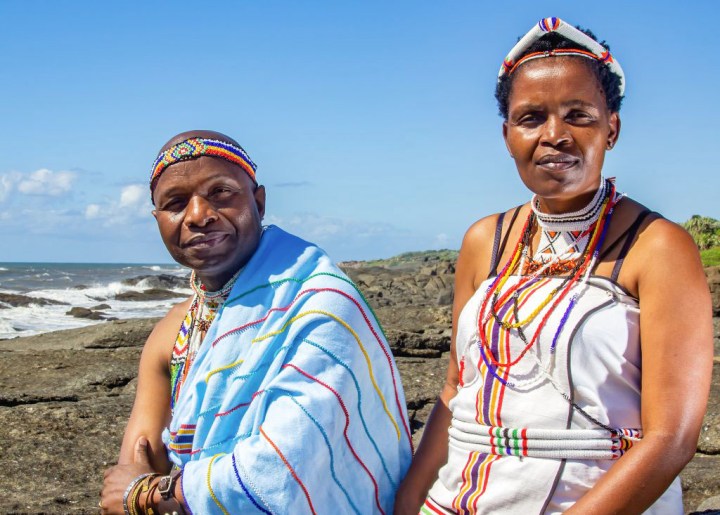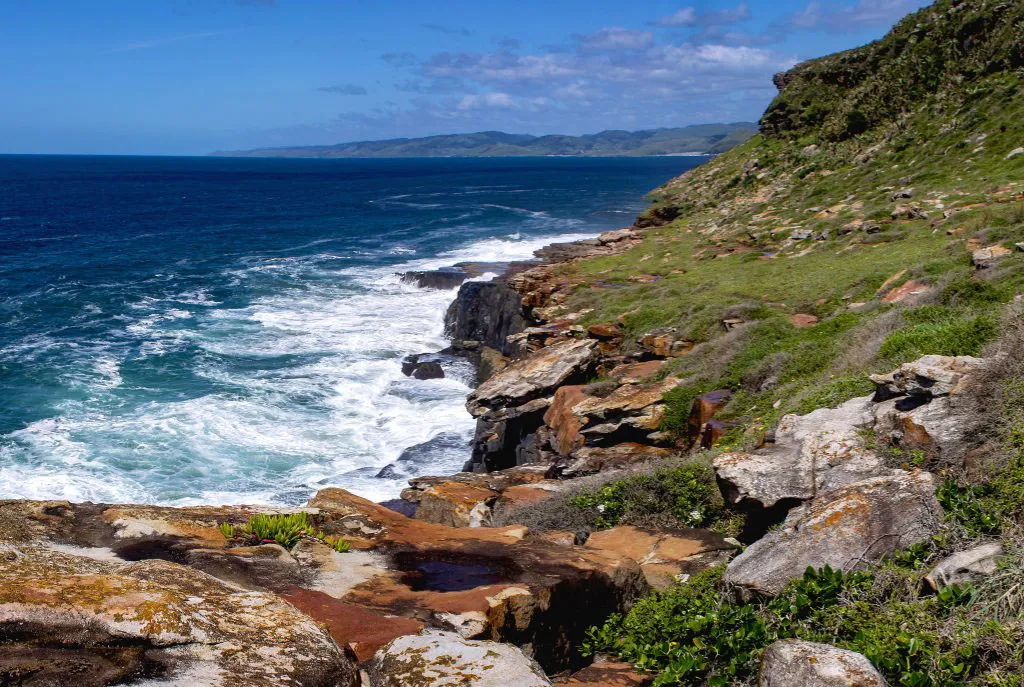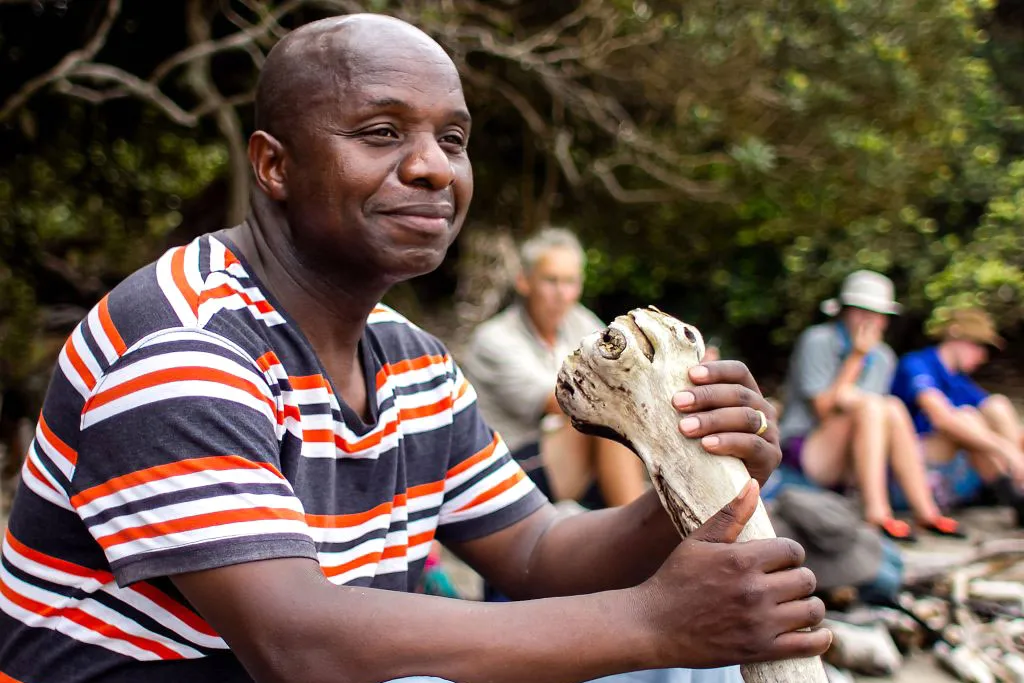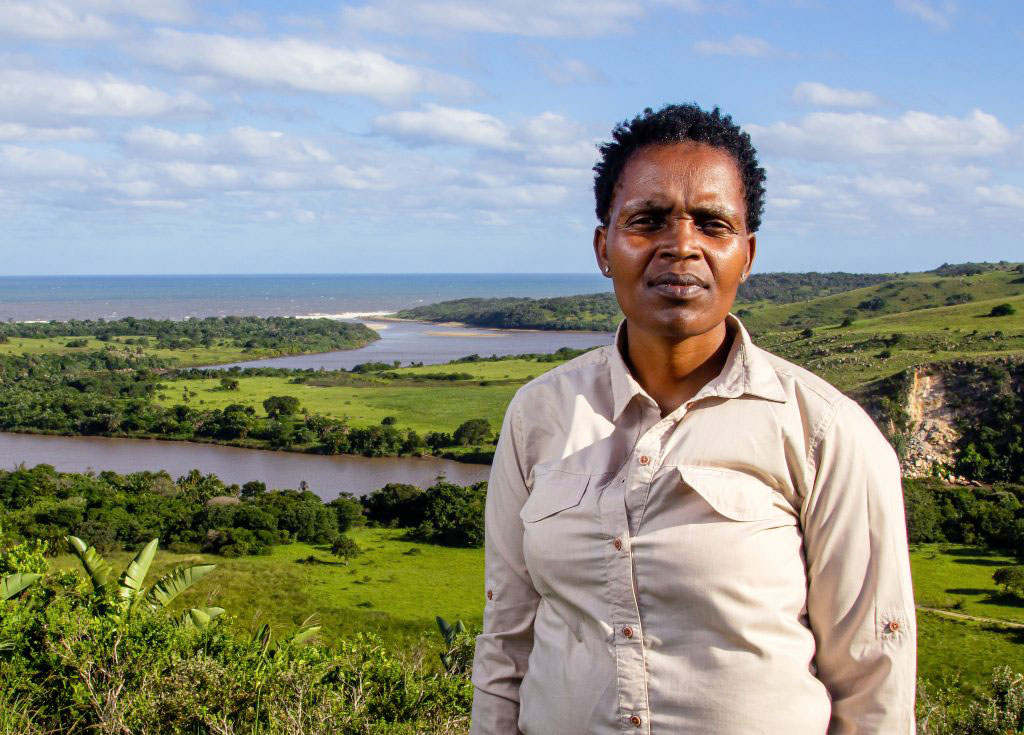Global honour for coastal guardians who told Shell to go to hell

Sinegugu Zukulu (left) and Nonhle Mbuthuma are the joint winners of an international award that honours the leadership of grassroots environmental activists across the world. (Photo: Goldman-Environmental-Prize)
By Tony Carnie
Two environmental activists, born in remote farm villages along the Wild Coast, have been honoured with a global environmental award for their role in halting seismic blasting tests by the Shell oil and gas multinational off the Eastern Cape coastline.
Sinegugu Zukulu and Nonhle Mbuthuma – who were both vilified as being “anti-development” and threatened with assassination during separate campaigns to prevent titanium dune mining along the same stretch of coastline – have been named joint winners of the 35th Goldman Environmental Prize for the Africa region.

Following a series of legal battles centred on the protection of the Wild Coast and livelihoods of local communities, the high court declared that oil and gas drilling tests by Shell and Impact Africa were unlawful and that there had been ‘no meaningful consultation’ with local people. (Photo: Goldman Environmental Prize)
Zukulu, 54, is a veteran ecotourism campaigner and former geography teacher at Kearsney College near Durban, while Mbuthuma, 46, is the co-founder and spokesperson for the Amadiba Crisis Committee, a community-based movement opposed to dune mining and other megaprojects along the northern section of the Wild Coast.
The Goldman Awards honour the achievements and leadership of grassroots environmental activists across the world.
Previous winners include Ken Saro-Wiwa, the Nigerian writer and activist hanged by the military government in 1995 for his campaigns against crude oil drilling in the Niger Delta; the late Kenyan “Green Belt” activist Wangari Maathai who went on to become the first African woman to receive the Nobel Peace Prize; and Berta Cáceres, the Honduran activist murdered in 2016, just a year after receiving the Goldman Prize.
Earlier today Zukulu and Mbuthuma received their prizes at a ceremony at the San Fransisco Opera House during which seven activists from several parts of the world were honoured for their efforts to draw public attention to threats facing the planet. They will travel to Washington DC later this week for a separate ceremony and a series of civic engagements.
According to the award citation, Zukulu and Mbuthuma played a key role in stopping Shell’s proposed seismic blasting tests for oil and gas along the Wild Coast.
This followed a series of court cases that culminated in a decision by the Eastern Cape Division of the High Court in Makhanda in 2022 declaring the exploration rights by Shell and Impact Africa to be unlawful.
The judges held that there had been “no meaningful consultation” with local communities and that Minister of Mineral Resources and Energy Gwede Mantashe also failed to take into account the impact on communities, their spiritual and cultural rights, harm to marine and bird life, and climate change.
“Organising their community, Nonhle and Sinegugu secured their victory by asserting the rights of the local community to protect their marine environment. By halting oil and gas exploration in a particularly biodiverse area, they protected migratory whales, dolphins, and other wildlife from the harmful effects of seismic testing,” the citation reads.
In his affidavit to the high court, Zukulu declared that: “The Wild Coast is a place of stunning natural beauty. Unlike other coastal stretches in South Africa, indigenous people have maintained continuous possession of this land despite waves of colonial and apartheid aggression.
“This is no accident. Our ancestors’ blood was spilt protecting our land and sea. We now feel a sense of duty to protect our land and sea for future generations, as well as for the benefit of the planet. Our land and sea are central to our livelihoods and our way of life.
“Multinational corporations now wish to blast our sea every ten seconds for five months with air gun bursts between 220 and 250 decibels – louder than a jet plane taking off – that will be heard underwater more than 100 kilometres away. They want to do this for one reason – to look for oil and gas that they can profit from while worsening the planet’s climate crisis.”

Former Kearsney College geography teacher and master raconteur Sinegugu Zukulu takes a break on the beach while leading a party of hikers on an educational tour of the Wild Coast. (Photo: Goldman Environmental Prize)
In an interview with Daily Maverick shortly before the award was announced officially, Zukulu recalled that he and Mbuthuma had both been labelled as “anti-development” while putting their lives at risk by speaking out to protect the long-term future of their land and community.
He said he was both humbled and encouraged by the award, which would help to showcase their efforts at a global level.
“I have been an activist for more than two decades, but you are not doing this for monetary reward or recognition. We do it because it makes sense to us,” said Zukulu, recalling that he embarked on his pathway “not even knowing that this was “activism”.
“If someone comes to your back yard to trash it, you say ‘No!’ … So, standing up, for me, is the logical path … Our land includes the environment – and the welfare of the people is dependent on the quality of the land, the air, fertile crops, clean water and natural resources. So, if you are alive, then you have to question wrong things.”
Born in the village of Baleni, he attended the local primary and secondary school – before scraping together loans from family and friends to enrol at the University of Transkei to study teaching, followed later by his Masters’ degree studies in environmental management at Stellenbosch University and an eight-year stint as a geography teacher at Kearsney College, a top private school for boys at Bothas Hill.
His passion for teaching was evident as a teenager, when he began sharing his knowledge by providing extra geography lessons for fellow pupils of Baleni Senior Secondary School.
His father became very ill while Zukulu was in Grade 1, so he was raised by his maternal grandmother – a staunch Anglican – when his mother had to move to Durban to find work to support the family.
While many of his classmates preferred to spend their free time herding cattle or hunting birds with catapults, Zukulu excelled at school and got stuck into his studies after discovering a largely unused local library.
After graduating in Umtata, Zukulu moved to Durban to teach at KwaDabeka High School in Clermont, Durban, before shifting to Kearsney at the invitation of the then headmaster, Owen Roberts.
“But I’m a Gemini. We get bored easily by routine and I needed a new challenge.”
So he left Kearsney and spent a year establishing a new teaching programme to assist rural schools before being appointed as an environmental education officer for the SA National Biodiversity Institute.
Zukulu is also a founding member of Sustaining the Wild Coast, a non-government organisation that works with local communities to promote environmental sustainability and earn income from ecotourism ventures along the Wild Coast.
He is also a registered tour guide and leads regular walking trips along the Pondoland coast to raise environmental awareness, with hikers sleeping overnight in the homes of local people.
“We need to demonstrate that ecotourism – not imposed development – is able to benefit local people on a sustainable basis,” he says.
Due to his vocal opposition to an Australian-led plan to strip mine the Wild Coast for heavy minerals, Zukulu learned in October 2006 that there was a price on his head. The alert was sounded by fellow anti-mining activist Siskosophi “Bazooka’ Radebe, who persuaded the hired assassin to call off the hit.
Radebe, however, was not as fortunate. Ten years after saving Zukulu’s life, Radebe was himself gunned down outside his home in the Lurholweni township in Mbizana in front of his teenage son. His murder remains unsolved.

Nonhle Mbuthuma has been beaten up and threatened with death for her work to promote sustainable development along the northern section of the Pondoland Wild Coast. (Photo: Goldman Environmental Prize)
Nonhle Mbuthuma – co-winner of the 2024 Goldman Prize – also had a lucky escape, having been tipped off by Radebe that she was on the assassination list due to her work with the Amadiba Crisis Committee.
Just hours before he was murdered, Radebe called her with a chilling warning: “They are not playing. They want to kill us.”
Undeterred, Mbuthuma has continued her opposition to the dune mining plan, as well as a plan by the SA National Roads Agency to build a new high-speed toll road through the rural homesteads and farmland of her friends and family.
More recently, she was among a group of seven women beaten with knobkieries and then treated for their injuries in hospital while trying to stop construction of a new property development – thought to be a hotel – in the village of Sigidi along the Wild Coast.
“Activists are being targeted or assassinated all over the world … I cope with these threats because of the support of my community. They see it as our fight – not my fight. We are fighting for future generations,” she told Daily Maverick.
Nevertheless, due to the physical and emotional strain of these threats, Mbuthuma says she is particularly grateful that her role as an activist has now been recognised internationally.
“I hope this award will help to strengthen the work we are doing on the Wild Coast and also encourage other local environmental activists to be more supportive.
“I am not ‘anti-development’. In fact, I am for development, but not when it destroys the environment we depend upon. The people and the environment are connected. There is no way they can work without each other, so development and ecology must meet halfway”
Though she can be feisty and outspoken, Mbuthuma states that she was a “very quiet, very focused student” and some of her former teachers later remarked how surprised they were when she emerged as an activist in adulthood.
She believes that her grandfather, who took part in the Pondoland Revolt in the early 1960s, helped to shape and inspire her current work.
“The battles that happened in the 1960s were no different to what is happening today,” she argues, “We are defending our people.
“People try to paint us … anti-development to pull us down and to try to make us feel selfish or inferior. It’s a colonisation of the mind. We must decide our own future rather than being told what to do. Economic development and mega-projects cannot come from the top down.”
Instead, Mbuthuma promotes a variety of community-led development projects that include eco-tourism, fishing cooperatives, the construction of more community access roads and agricultural support programmes for local farmers.
“It is possible to achieve these things. But we must have a government of the people … There must be an ear to listen.” DM

Sinegugu Zukulu (left) and Nonhle Mbuthuma are the joint winners of an international award that honours the leadership of grassroots environmental activists across the world. (Photo: Goldman-Environmental-Prize)
By Tony Carnie
DAILY MAVERICK
29 Apr 2024
29 Apr 2024
Two environmental activists, born in remote farm villages along the Wild Coast, have been honoured with a global environmental award for their role in halting seismic blasting tests by the Shell oil and gas multinational off the Eastern Cape coastline.
Sinegugu Zukulu and Nonhle Mbuthuma – who were both vilified as being “anti-development” and threatened with assassination during separate campaigns to prevent titanium dune mining along the same stretch of coastline – have been named joint winners of the 35th Goldman Environmental Prize for the Africa region.

Following a series of legal battles centred on the protection of the Wild Coast and livelihoods of local communities, the high court declared that oil and gas drilling tests by Shell and Impact Africa were unlawful and that there had been ‘no meaningful consultation’ with local people. (Photo: Goldman Environmental Prize)
Zukulu, 54, is a veteran ecotourism campaigner and former geography teacher at Kearsney College near Durban, while Mbuthuma, 46, is the co-founder and spokesperson for the Amadiba Crisis Committee, a community-based movement opposed to dune mining and other megaprojects along the northern section of the Wild Coast.
The Goldman Awards honour the achievements and leadership of grassroots environmental activists across the world.
Previous winners include Ken Saro-Wiwa, the Nigerian writer and activist hanged by the military government in 1995 for his campaigns against crude oil drilling in the Niger Delta; the late Kenyan “Green Belt” activist Wangari Maathai who went on to become the first African woman to receive the Nobel Peace Prize; and Berta Cáceres, the Honduran activist murdered in 2016, just a year after receiving the Goldman Prize.
Earlier today Zukulu and Mbuthuma received their prizes at a ceremony at the San Fransisco Opera House during which seven activists from several parts of the world were honoured for their efforts to draw public attention to threats facing the planet. They will travel to Washington DC later this week for a separate ceremony and a series of civic engagements.
According to the award citation, Zukulu and Mbuthuma played a key role in stopping Shell’s proposed seismic blasting tests for oil and gas along the Wild Coast.
This followed a series of court cases that culminated in a decision by the Eastern Cape Division of the High Court in Makhanda in 2022 declaring the exploration rights by Shell and Impact Africa to be unlawful.
The judges held that there had been “no meaningful consultation” with local communities and that Minister of Mineral Resources and Energy Gwede Mantashe also failed to take into account the impact on communities, their spiritual and cultural rights, harm to marine and bird life, and climate change.
“Organising their community, Nonhle and Sinegugu secured their victory by asserting the rights of the local community to protect their marine environment. By halting oil and gas exploration in a particularly biodiverse area, they protected migratory whales, dolphins, and other wildlife from the harmful effects of seismic testing,” the citation reads.
In his affidavit to the high court, Zukulu declared that: “The Wild Coast is a place of stunning natural beauty. Unlike other coastal stretches in South Africa, indigenous people have maintained continuous possession of this land despite waves of colonial and apartheid aggression.
“This is no accident. Our ancestors’ blood was spilt protecting our land and sea. We now feel a sense of duty to protect our land and sea for future generations, as well as for the benefit of the planet. Our land and sea are central to our livelihoods and our way of life.
“Multinational corporations now wish to blast our sea every ten seconds for five months with air gun bursts between 220 and 250 decibels – louder than a jet plane taking off – that will be heard underwater more than 100 kilometres away. They want to do this for one reason – to look for oil and gas that they can profit from while worsening the planet’s climate crisis.”

Former Kearsney College geography teacher and master raconteur Sinegugu Zukulu takes a break on the beach while leading a party of hikers on an educational tour of the Wild Coast. (Photo: Goldman Environmental Prize)
In an interview with Daily Maverick shortly before the award was announced officially, Zukulu recalled that he and Mbuthuma had both been labelled as “anti-development” while putting their lives at risk by speaking out to protect the long-term future of their land and community.
He said he was both humbled and encouraged by the award, which would help to showcase their efforts at a global level.
“I have been an activist for more than two decades, but you are not doing this for monetary reward or recognition. We do it because it makes sense to us,” said Zukulu, recalling that he embarked on his pathway “not even knowing that this was “activism”.
“If someone comes to your back yard to trash it, you say ‘No!’ … So, standing up, for me, is the logical path … Our land includes the environment – and the welfare of the people is dependent on the quality of the land, the air, fertile crops, clean water and natural resources. So, if you are alive, then you have to question wrong things.”
Born in the village of Baleni, he attended the local primary and secondary school – before scraping together loans from family and friends to enrol at the University of Transkei to study teaching, followed later by his Masters’ degree studies in environmental management at Stellenbosch University and an eight-year stint as a geography teacher at Kearsney College, a top private school for boys at Bothas Hill.
His passion for teaching was evident as a teenager, when he began sharing his knowledge by providing extra geography lessons for fellow pupils of Baleni Senior Secondary School.
His father became very ill while Zukulu was in Grade 1, so he was raised by his maternal grandmother – a staunch Anglican – when his mother had to move to Durban to find work to support the family.
While many of his classmates preferred to spend their free time herding cattle or hunting birds with catapults, Zukulu excelled at school and got stuck into his studies after discovering a largely unused local library.
After graduating in Umtata, Zukulu moved to Durban to teach at KwaDabeka High School in Clermont, Durban, before shifting to Kearsney at the invitation of the then headmaster, Owen Roberts.
“But I’m a Gemini. We get bored easily by routine and I needed a new challenge.”
So he left Kearsney and spent a year establishing a new teaching programme to assist rural schools before being appointed as an environmental education officer for the SA National Biodiversity Institute.
Zukulu is also a founding member of Sustaining the Wild Coast, a non-government organisation that works with local communities to promote environmental sustainability and earn income from ecotourism ventures along the Wild Coast.
He is also a registered tour guide and leads regular walking trips along the Pondoland coast to raise environmental awareness, with hikers sleeping overnight in the homes of local people.
“We need to demonstrate that ecotourism – not imposed development – is able to benefit local people on a sustainable basis,” he says.
Due to his vocal opposition to an Australian-led plan to strip mine the Wild Coast for heavy minerals, Zukulu learned in October 2006 that there was a price on his head. The alert was sounded by fellow anti-mining activist Siskosophi “Bazooka’ Radebe, who persuaded the hired assassin to call off the hit.
Radebe, however, was not as fortunate. Ten years after saving Zukulu’s life, Radebe was himself gunned down outside his home in the Lurholweni township in Mbizana in front of his teenage son. His murder remains unsolved.

Nonhle Mbuthuma has been beaten up and threatened with death for her work to promote sustainable development along the northern section of the Pondoland Wild Coast. (Photo: Goldman Environmental Prize)
Nonhle Mbuthuma – co-winner of the 2024 Goldman Prize – also had a lucky escape, having been tipped off by Radebe that she was on the assassination list due to her work with the Amadiba Crisis Committee.
Just hours before he was murdered, Radebe called her with a chilling warning: “They are not playing. They want to kill us.”
Undeterred, Mbuthuma has continued her opposition to the dune mining plan, as well as a plan by the SA National Roads Agency to build a new high-speed toll road through the rural homesteads and farmland of her friends and family.
More recently, she was among a group of seven women beaten with knobkieries and then treated for their injuries in hospital while trying to stop construction of a new property development – thought to be a hotel – in the village of Sigidi along the Wild Coast.
“Activists are being targeted or assassinated all over the world … I cope with these threats because of the support of my community. They see it as our fight – not my fight. We are fighting for future generations,” she told Daily Maverick.
Nevertheless, due to the physical and emotional strain of these threats, Mbuthuma says she is particularly grateful that her role as an activist has now been recognised internationally.
“I hope this award will help to strengthen the work we are doing on the Wild Coast and also encourage other local environmental activists to be more supportive.
“I am not ‘anti-development’. In fact, I am for development, but not when it destroys the environment we depend upon. The people and the environment are connected. There is no way they can work without each other, so development and ecology must meet halfway”
Though she can be feisty and outspoken, Mbuthuma states that she was a “very quiet, very focused student” and some of her former teachers later remarked how surprised they were when she emerged as an activist in adulthood.
She believes that her grandfather, who took part in the Pondoland Revolt in the early 1960s, helped to shape and inspire her current work.
“The battles that happened in the 1960s were no different to what is happening today,” she argues, “We are defending our people.
“People try to paint us … anti-development to pull us down and to try to make us feel selfish or inferior. It’s a colonisation of the mind. We must decide our own future rather than being told what to do. Economic development and mega-projects cannot come from the top down.”
Instead, Mbuthuma promotes a variety of community-led development projects that include eco-tourism, fishing cooperatives, the construction of more community access roads and agricultural support programmes for local farmers.
“It is possible to achieve these things. But we must have a government of the people … There must be an ear to listen.” DM
No comments:
Post a Comment